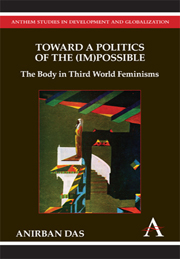Book contents
- Frontmatter
- Contents
- Acknowledgements
- Introduction
- 1 Body, Power and Ideology
- 2 Thinking the Body: Metaphoricity of the Corporeal
- 3 Thinking the Body: Negotiating the Other/Death
- 4 Thinking the Body: Beyond the Topos of Man
- 5 Violence and Responsibility: Embodied Feminisms
- In Conclusion: Toward a Politics of the (Im)Possible
- Notes
- Bibliography
- Index
In Conclusion: Toward a Politics of the (Im)Possible
Published online by Cambridge University Press: 05 March 2012
- Frontmatter
- Contents
- Acknowledgements
- Introduction
- 1 Body, Power and Ideology
- 2 Thinking the Body: Metaphoricity of the Corporeal
- 3 Thinking the Body: Negotiating the Other/Death
- 4 Thinking the Body: Beyond the Topos of Man
- 5 Violence and Responsibility: Embodied Feminisms
- In Conclusion: Toward a Politics of the (Im)Possible
- Notes
- Bibliography
- Index
Summary
Start with the ultimate question in politics.
What is to be Done?
May one (can one?) question the question itself? Question the primacy of this one question that circumscribes – limits, defines, paradoxically deifies – theory? Puts theory to the ultimate test of effectivity. Can one seriously contest the word is between the query ‘what’ and the phrase ‘to be done’, question the surety in the be-ing of the act? As Simon Critchley (1999a, 2) reminds us, “… the copula in predicative propositions – S is P – is one of the principal targets of deconstruction”.
But remember, questioning does not mean a forgetting, not a total abandonment of the matter at hand. One engages as one interrogates.
What is to be done? How to engage with the problem, responsibly? The history of the more than hundred years that separate us from Lenin's raising of that question is not innocent enough for an easy response.
Before embarking on the seemingly fashionable gesture of deconstructing the query, before the ‘petty’ squabbles about words that irritate the propriety of the ‘responsible’ theorizer, let us move on to another sentence known well for its direct condemnation of ‘armchair theorists’ and an almost unequivocal call to action:
The philosophers have only interpreted the world in various ways; the point is to change it.
Let us remember the way Gayatri Chakravorty Spivak (1985, 346) has dealt with the word ‘change’.
- Type
- Chapter
- Information
- Toward a Politics of the (Im)PossibleThe Body in Third World Feminisms, pp. 163 - 172Publisher: Anthem PressPrint publication year: 2010



